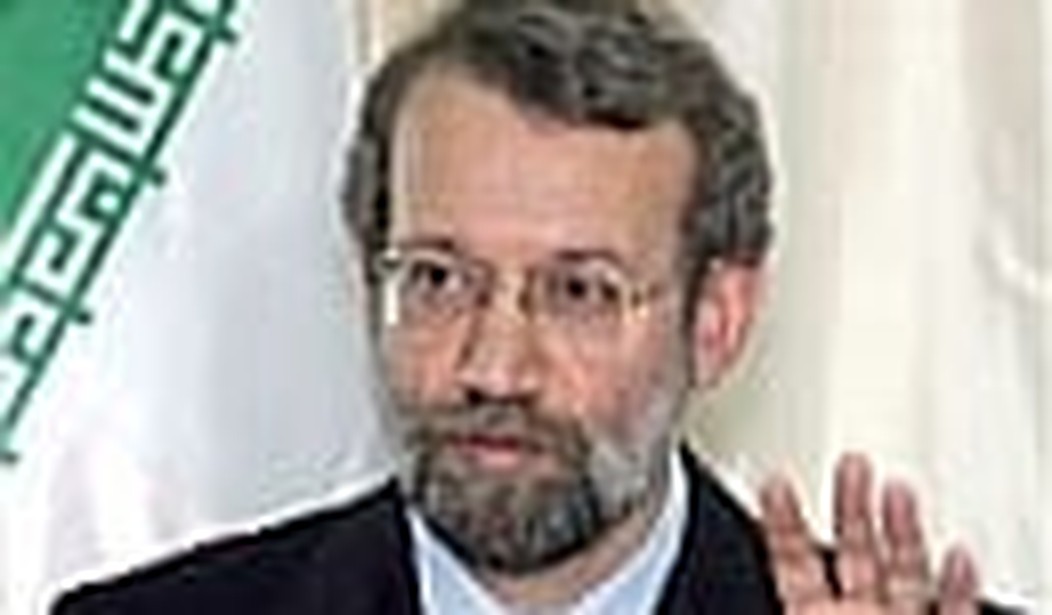The resignation of Ali Larijani, the Secretary of Iran’s Supreme National Security Council who was also Iran’s top nuclear negotiator on Saturday, caught the international community by complete surprise.
His sudden resignation can be clearly traced to the major differences between him and Iran’s president Mahmoud Ahmadinejad, centering around how to move Iran’s nuclear program forward.
Ahmadinejad does not believe in compromises when it comes to the nuclear program. To him, the reformists who have agreed to suspend Iran’s nuclear program, are as traitorous as the corrupt Iranian leaders who surrendered Iranian territory to the Russians in the Golestan and Turkemanchai agreements in the early 1800s.
To him, as he once put it, Iran’s nuclear program is like “a train with no brakes”. In other words, Iran does not need to make compromises for anyone. It is the West, especially the United Sates who has nuclear weapons and has used them, who must compromise, and not Iran.
Larijani on the other hand, urged caution. Now, he did not do this because he is pro-West. In fact, once he openly threatened that if the US attacks his country, Iran would “put Israel in a wheelchair”. He has also repeatedly attacked the presence of US troops in Iraq, and the policies of President Bush in the region. Larijani’s calls for caution stemmed from the fact that he was far more experienced than Ahmadinejad, both in terms of holding senior government positions and dealing with Westerners.
Whereas Ahmadinejad had travelled outside of Iran only once prior to becoming President (to Lebanon), Larijani, prior to the revolution had travelled to many countries, including to California, United Sates, to meet his brother Javad, who was studying mathematics at the University of California at Berkeley. Furthermore, Larijani has an in-depth understanding of Western philosophy. He holds a PhD in the subject from Tehran University and has even published a number of books about Immanuel Kant, regarded as one of the most influential thinkers of modern Europe. This education has brought Larijani a broad understanding of the international political arena, thus making him far less isolationist and inward-looking than Ahmadinejad.
Realizing this from early on, Ahmadinejad has tried his best to undermine Larijani. While it is true that he appointed Larijani to lead Iran’s nuclear negotiation team, it is believed that Ahmadinejad had no choice in the matter. He was reportedly ordered to do this by Iran’s Supreme Leader, Ayatollah Khamenei, who had known Larijani for many years and had trusted him. Subsequently, as a means of indirectly removing Larijani without firing him, he has systematically undermined him and his efforts to keep channels of dialogue open with the West.
Ahmadinejad’s constant threats to eliminate Israel and to deny the Holocaust were one method. His constant attacks complicated Larijani’s efforts to try to show the West that it is dealing with a country which is run by rational leaders. According to some Iran observers, Larijani has been increasingly disgusted with having to explain to high ranking officials such as Javier Solana and El Baradei that Ahmadinejad’s outrageous statements were the President’s opinion, and that others in the government do not share them.
After having essentially given up, Larijani repeatedly tried to resign, however his resignation was not accepted. One of the suggested reasons is that Ayatollah Khamenei did not accept it, as he did not want to show sign of cracks in Iranian leadership to the West. Furthermore, it is very possible that Khamenei wanted to use Larijani’s good relations with Solana and El-Baradei as means of keeping avenues of dialogue open.
For Larijani, the straw which finally broke the camel’s back seems to have come from Russian president Vladimir Putin’s recent visit to Tehran. It is reported that during the visit, Putin suggested a new diplomatic solution to the dispute surrounding Iran’s nuclear program. Larijani openly acknowledged that a plan had been put forward by the Russians. Ahmadinejad, trying to shut out any talk of settlement, refused to even publicly acknowledge its existence. All Ahmadinejad was willing to say was that Putin’s message during his visit was that of “friendship and cooperation”.
The resignation of Ali Larijani, and his replacement with Saeed Jalili should for at least the short term send shivers down the spine of anyone who is looking for a negotiated settlement for the current Iranian nuclear crisis. Jalili, an Ahmadinejad ally and an inexperienced official whose highest experience comes from his post as deputy foreign minister for European and American affairs, will be nothing more than a yes man to the President. Even more worrying than that is the fact that his appointment has been approved by Ayatollah Khamenei, Iran’s Supreme Leader, as is normally the case for such a high ranking post. On the surface at least, the appointment of Jalili, which comes two months after the appointment of Jafari as the new head of the Islamic Revolutionary Guards Corp (IRGC) can be taken as a strong sign that Khamenei has quite possibly given up on finding accommodation with the West and is instead preparing his country for a military showdown.
Meir Javedanfar is the co-author of “The Nuclear Sphinx of Tehran – Mahmoud Ahmadinejad and the State of Iran.” He runs Middle East Economic and Political Analysis (Meepas)









Join the conversation as a VIP Member